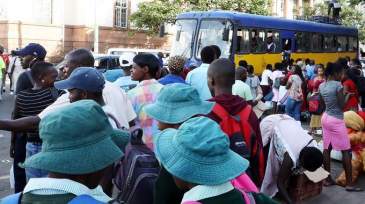Police in Bulawayo have ordered companies and organisations to register staff buses which ferry their employees to and from work, under the Zimbabwe United Passenger Company (ZUPCO), which has been made the sole public transporter under the government’s Covid-19 control measures.
This comes at a time when the law enforcement agents have since impounded over 209 pirate vehicles under the ongoing operation, which has left commuters in the city stranded due to ZUPCO’s inefficiencies.
Local government minister, July Moyo, recently threatened to unleash the army to deal with illegal transport operators who continuously violate Covid-19 regulations.
Speaking during a press briefing, Thursday, at Ross Camp, acting Bulawayo provincial police spokesperson, Assistant Inspector Nomalanga Msebele said it was a requirement that all vehicles that transport members of the public within the city register under ZUPCO including staff buses for companies and organisations.
“As police, we say there is no selective application of law hence staff buses and vehicles ferrying school children not contracted under ZUPCO are not allowed to operate,” said Msebele, adding that only ZUPCO-contracted commuter omnibuses are allowed to be hired as staff buses or to ferry school children.
“Some of these commuter omnibuses are not even contracted by the companies or schools that they claim to be serving,” she said.
“This kind of operation is illegal as only those commuter omnibuses that are contracted to ZUPCO are allowed to operate. Passengers are warned from boarding non-ZUPCO kombis or buses at undesignated points as they face being arrested. More so, these kombis no longer have a certificate of fitness hence they will put passengers’ lives at risk as they no longer have passenger insurance hence posing to be a potential hazard to the public. Passengers risk their lives as these vehicles go against road rules and signs for example going one way and red robots fleeing away from the police.”
Msebele said the police were dealing with the increase in the number of vehicles illegally ferrying passengers within the city.
“Bulawayo province has noted that there has been an influx of non- ZUPCO) kombis, plate-less vehicles, illegal pirate taxis and increase of touts in the central business district (CBD) and western suburbs,” said Msebele.
“As a way of enforcing, police in Bulawayo have arrested 209 public service vehicles of which 121 are commuter omnibuses (kombis), and the remaining being Mshikashika operating motor vehicles and also defying the Road Traffic Act and Covid 19 regulations. These vehicles are a menace in the CBD and they park at undesignated points.”
Msebele urged owners of the vehicles to comply with the government directive and stop playing the cat and mouse game with the police.
“As the police, we are going to carry out our constitutional mandate which is enforcing the laws and regulations. Furthermore, owners of such vehicles will be charged for permitting the vehicle to operate whilst it is not affiliated to ZUPCO as per the requirements of Statutory Instrument 83/2020. Police will also charge the drivers and send them to court for venturing into transport business inter or intra city during the national lockdown,” she said.
A total of 13 touts, Msebele said, have so far been arrested during the crackdown.

